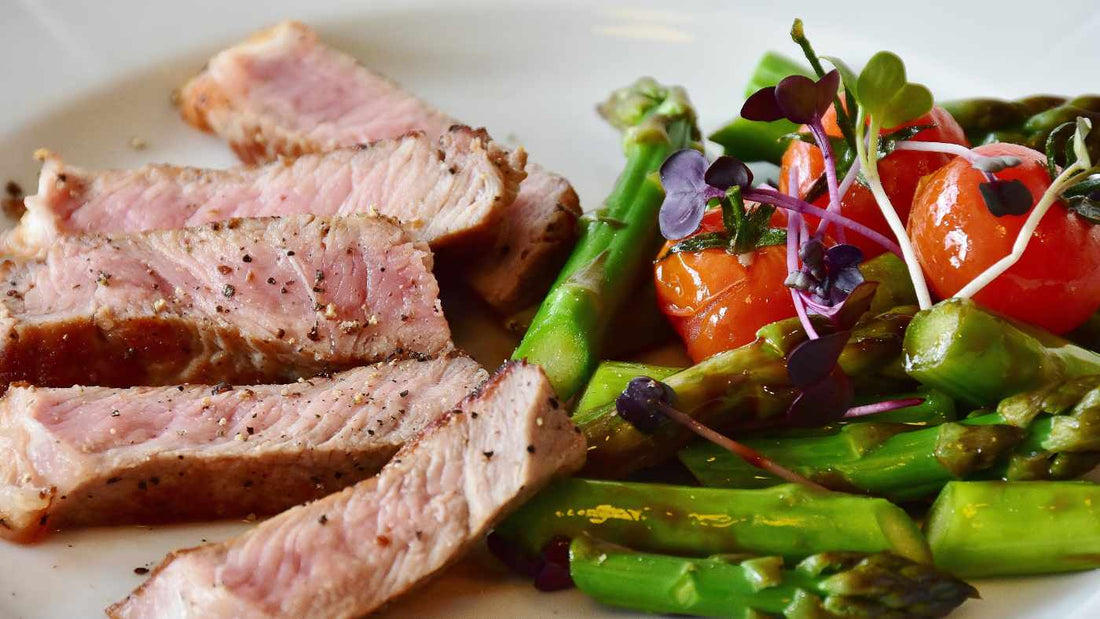
Fitness Newbie: Veggies? or Animal Diet Route?
Share
So maybe you decided to bite the bullet and take on that CrossFit membership you purchased some months ago, and after your first day at the gym, you realize you're way more exhausted than usual.
Your former eating pattern either leaves you feeling too full or so hungry you could eat a lion.
And now you're wondering if you should lean more towards a vegetarian-style diet or an animal-based diet to find what works best for your fitness goals—cutting, lean bulking, big bulking, or just building your muscle groups.
First off, big congrats for taking that bold first step to getting fit (it's usually the hardest).
Most fitness newbies have a hard time picking out foods that'll leave them with just the right amount of satiety and support their goals in the long run.
Before I get into the details of which diet best serves your goals, I suggest highlighting the diet that'll take you in the opposite direction from your goal: the Standard American Diet (SAD).
Fried or salty foods and ultra-processed foods with added sugars are road bumps on your path.
This isn't to say you can't dig into a Big Mac on your cheat day; try to dial back and cut out as many processed foods as possible to achieve your desired form or strength.
That said, here's everything you need to know to decide if you need more veggies or steak as you pump weights at the gym.
Protein: Your fitness sidekick

Did you know that the word "protein" is a Greek word that translates to "of the utmost importance"?
If you think about it, it's a befitting name for the macronutrient—the spark plug that lights up every cell in our bodies.
In addition to boosting your metabolism and providing energy, protein is the most satiating macronutrient.
After an exhausting session at the gym, a protein-rich diet is your best option for feeling full while maintaining your calorie deficit.
It's why most health blogs advise that your post-workout (and even pre-workout meal) should be protein-rich.
Having a bowl of broccoli or a fruit smoothie post-workout is remarkable.
However, the fructose in the meal doesn't stimulate the satiety center of your brain nearly as much as protein would, so you'd have to eat more significant portions to feel full, which can disrupt your caloric balance.
Regarding your protein intake, a healthy adult needs to consume about 1.5 grams per pound of their body weight.
During exercise, your muscle tissues go through wear and tear, which means you need more protein for repairs than the average person (think 1-2g per pound of your body weight).
You can have more dinners with steak on the table or try an animal-based protein shake to up your levels.
Speaking of animal-based shakes, serving our Nose-To-Tail Protein mix in a shaker bottle gives you 21g of much-needed protein to support your workout.
Also, according to John Hopkins Medicine, choosing proteins high in healthy fats (like salmon and whole eggs) may help you breathe easier.
Veggies and fruits for your “low” days

What's the best combo for getting those newbie gains and good form?
It is a great workout and an excellent recovery system.
On days you feel sore all over, it might be tempting to fight through the pain and hit the treadmill regardless, but if you're not letting your body recover adequately before going hard at it again, you're undoing your gym efforts.
Your overall performance will decline if a sore elbow is not fully recovered. That's where veggies come in.
A veggie-heavy diet like spinach is filled with nutrients that ward off inflammation.
Blueberries contain sirtuins that modulate inflammatory pathways and assist with muscle recovery.
In one study, men who supplemented their diet with green tea extract had reduced markers of muscle damage.
Plus, veggies always look out for your gut when you're going hard at the gym.
Working out helps increase microbial species in the gut, while veggies provide fiber, keeping you feeling fuller and your blood sugar in check.
Do you need supplements as a newbie?
At the beginning, not really. You can gain impressive newbie gains by training, eating, and getting enough rest.
If your body still needs some support to adjust to your new routine regarding recovery, more energy, etc.
It's okay to use some supplements at the beginning.
But the toned arms, defined six-packs, or weight loss you seek are still within reach, even if you only use a few supplements.
Final thoughts
Whatever your fitness goals are, they'll be easier to achieve with more protein in your diet.
Protein is what keeps your cells going. If you're not accustomed to eating a significant portion of a proteinous meal, you can eat many small meals throughout the day.
Veggies and fruits will look out for you when you're sore and can't reach for a jar on the kitchen shelf.
They help reduce inflammation and speed up your recovery. Above all, try to have fun with your workouts.
Refrain from beating yourself up when you're not smashing new PRs; ensure you're training your muscle groups properly and eating healthy.



